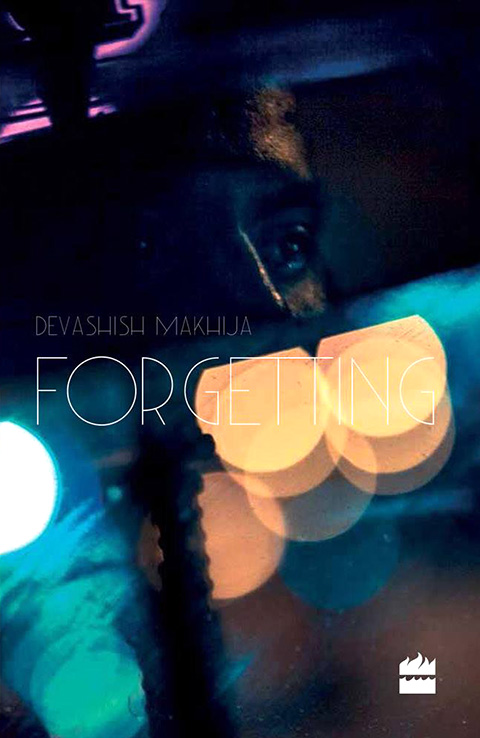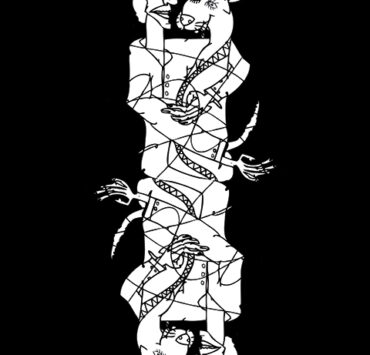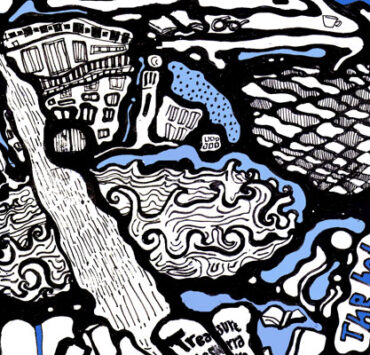1. Lohhovalsa
The village shimmered high up on the hill, as if being licked to sleep by some unseen tongue of fire. The unit was scared. And tired. Sushil didn’t know which of the two he felt more. He stopped his racing mind for a moment, to think. He decided it would have to be ‘tired’. The fifteen of them had already walked twelve kilometres through the jungles. The mere sight of this hill, looming before him like a large angry snake, made his knees wobble. But they couldn’t stop, not now. He slipped his automatic rifle off his left shoulder and swung it onto his right.
This was the least they could do to stay alive. Walk. Almost every other convoy of C.R.P.F. jawaans that had dared to move around on wheels in these parts had never made it back to their camp alive from their ‘combing’ operations. Sushil remembered helping clear the Malkangiri road of uniformed bodies last week. Once they had finished, they had spent another day looking for the heads that had belonged to those bodies.
It’s what tribes used to do when they went to war.
But this can’t be a ‘war’ thought Sushil, perturbed. The Maoists aren’t a ‘tribe’, though some of them might be tribals. The C.R.P.F. certainly isn’t. Which tribe hunts for a monthly salary?
Sushil’s left shoulder throbbed with a raw pain. He touched it under his green camouflage shirt. It was bleeding. He clenched his jaw, spoke to his shoulder, and kept walking. Since, in the middle of an operation, there was never time to tend to a wound, he had learnt to speak to those parts of himself that would give up on him. He now told his left shoulder to stop bleeding. Please. And that if they made it back to camp alive tonight, he’d take care of it before dawn. Promise.
That reminded Sushil of the snake bite on his right ankle. Suddenly his ankle started to throb too. So he spoke to both of them—his ankle and his shoulder.
The primary healthcare worker who had visited their camp yesterday had wondered aloud as she sucked the venom out of his ankle and dressed the wound in haldi. She had said that the snakes here had bitten more C.R.P.F. soldiers in the last month than they had tribals in the last 18 years she had been practising in that region. ‘Why do you think?’ Sushil had asked. She had looked up at him then with glassy eyes and said, ‘The adivasi doesn’t threaten the snake.’
The five of them took a deep breath and thundered into the village from its uphill entrance, making sure they announced their entry with a solitary gunshot, followed by as many shouts, broken pots, frightened livestock and kicked-in bamboo doors as possible. If any of the villagers tried to sneak out now, they’d be waylaid by the other two parties, cutting off the entrance to the forest on the right and the way uphill on the other side of the village. They knew this village like they knew their own morning stubble. And to think none of them had ever been this far inside the jungle before tonight. But then there’s a lot you can learn from a widowed P.H.C. worker threatened to being branded a ‘Maoist-sympathiser’ unless she proved herself otherwise.
And being labelled a Maoist-sympathiser in these parts robbed you of the right to resist a gang-rape.
Sushil had never found this operation agreeable. Green Hunt, they called it. And rightly so, since most captured rebels were carried out of the jungle hung like ‘game’, their wrists and feet tied to bamboo sticks. Sushil wondered what stopped the government from roasting these people they captured, and eating them. ‘If we’re going to go so far,’ he thought, ‘we might as well go all the way.’
But he didn’t raise his voice, not once. He needed the money he earned. Dissent would only earn him a court martial. And back home, there was no longer any land left that he could farm. So on nights such as this one, Sushil also spoke to his heart, telling it to stop bleeding, for now. That he’d tend to it in the morning. But when morning came he tried his best to ignore the deep, hollow pain that echoed through it.
It wasn’t hard actually. There was always some other part of his body that required more immediate attention.
As the fifteen of them converged at the centre of the adivasi village, their rifles pointed, their eyes more fearful than furious, they saw the villagers gathered around a large bonfire. They had all gone statue-still, in the middle of some ritual. They seemed to Sushil like a tableaux frozen in time. Like he had just walked into a tribal museum, and was gaping at the central exhibit. But the breath heaving in those chests displaced that thought. All the adivasi men had bows slung across their chests, and a leather quiver of arrows on their backs. The little bits of metal pierced all over the women’s faces flickered in the firelight. In another place, at another time, Sushil would’ve sworn they looked ethereal. But here, tonight, the sight of their raw, almost animal like beauty made his bladder quiver. To keep himself from draining into his pants he cocked his rifle.
The sound broke the deadlock. Ranjan, the only jawaan who spoke Oriya in the unit, asked the villagers where Singanna was. Thirty pairs of unflinching eyes stared back at him. Ranjan, his eyes darting about, inspecting the darkness beyond the perimeter of the fire’s light, repeated the query, emphasizing ‘Singanna’, knowing, as did the rest of them, that there was very little chance the villagers understood Oriya, or any of the Indian republic’s other languages, given that there were hundreds of tribal dialects in Orissa alone. But that name—Singanna—was sure to get a reaction.
And it did.
A young man, Ghenua, standing closest to the fire, breathing hard, as if he had been running fast, and had suddenly stopped just now, shook his head, glaring at Ranjan even as he did.
They had been told Singanna hailed from this village, Lohhovalsa, and that he had recently—after spending years fighting for tribal rights—turned rogue and joined the Maoists. What choice had he, wondered Sushil, when they had been briefed that evening. Things had now come to such a head that anyone who came close to questioning any of the state’s decisions was now branded a ‘sympathiser’ and hunted down. But on the other hand, thought Sushil, perhaps it’s the way I feel, maybe there’s more to this than I’ll ever know or understand. And that thought always brought him some peace. Because not knowing meant that you had to follow orders without question and so you wouldn’t hesitate in combat. Which in turn meant you stood very little chance of being killed. Also, you continued to retain a job that paid. Even if not on time. Now how many youngsters from his village in Chhattisgarh could claim that.
The pop and crackle of the bonfire was beginning to fill up this silent void. The sound also made them nervous. Ranjan now looked around, confused, not knowing what to do next. His eyes met Pradip’s, who told him, in Hindi, to ask that young man if he knows Singanna. Ranjan muttered, ‘Boss, they don’t speak Oriya, and I don’t speak their language.’ Pradip, his shoulders starting to twitch, turned to Ghenua himself and barked in Hindi, ‘We know Singanna is from this village. Now tell us where he is or we won’t leave.’
Silence.
‘Singanna, Singanna!’ He repeated as he stomped his boots, hoping the action would scare somebody… anybody.
Sushil didn’t much care for Pradip. Actually there was very little in Orissa Sushil cared much for.
Just then, Pradip saw Ghenua’s hand reach for his bow. As Sushil yelled—‘Pradip, no!’—Pradip lunged for Ghenua and rammed his rifle butt into his chin. Ghenua fell. A dozen other hands reached for their bows. More boots stomped. Rifles got cocked. Gunshots fired into the sky. Women screamed. Before he knew it, Sushil was threatening some of the villagers with gunshots screaming ‘Singanna? Singanna?’ as if the chanting of that one word would absolve him of any wrong he were about to commit.
The bonfire was a lump of smoking ash when they dragged their hurting, tired selves down the hill, their arms laden with small sacks of foodgrain, and captive, dizzy chickens slung over their shoulders. They darted through the jungle in deathly silence. No one was quite sure of what they had just done. Thirteen breaths caught in a panicked choke once when Sushil stepped on a dry twig.
Only Pradip was calm.
While Kabir was numb with shock.
2. Kabir
‘28 November 2008,’ she says on the news. ‘Two days.’ ‘48 hours.’ With such emphasis like she were in some apocalypse movie trailer. They’re still firing. From the hotel’s windows. The gunshots are barking inside my head, bursting into red clouds. I snort another line. My sixth today. I ought to stop. I stare at the smoke on the T.V. screen. There are words all over it. Big bold letters. ‘26/11.’ ‘Mumbai under siege.’ ‘Terror.’
Terror. Noun.
Terrific. Adjective.
This powder’s terrific. A phone rings. I mimic it, hoping it’ll get irritated and stop. It stops. Knocking. On my room door. Ma’s voice. Fuck. I didn’t think she’d be up this late. I feel the buzz deserting me as the blood rushes back into my head.
‘Kabir?’
‘Haan?’ I mumble, hoping she’ll go away.
‘Mallika called,’ she says, waiting for a response from me. I’m fumbling to clear the little coke mound off my exam board. I’ll need to turn on the exhaust fan in the loo, so that the room can lose the smell. What if she walks in now… but she never does that… but what if she does?
‘Rahul is still inside the Taj,’ she says.
And my hands start to tremble.
Standing outside the Taj hotel, turning away from the smoke still bleeding from its steeples, I look down at the vein in my right arm. It lies motionless under my skin like a mottled snake, black blotches everywhere I have pierced it with my needle. I open and close my fist a few times, feel the blood throb through the snake and fight back a sudden tear.
I start walking. Past the tired N.S.G. commandos taking naps in the bus windows. Past blood-stained stretchers. Past cameras, agitated men and women with mikes, pads, pens, vada pavs, cigarettes, all looking at one another and at me like they’re afraid it might be their turn to die next. I keep tripping over my own feet all the way to J. J. Hospital. But the rhythm of the walking calms my pounding heart. My vision is blurry. I picture my eyes bloodshot. Blood. Shot. Perfect words for a day like this one. Blood. Shot. Blood. At the hospital, I find a volunteer, get him to put my name down as a donor, trip in at the end of a very long queue of talkative people, and I freeze.
My blood still has last night’s shit. Hell, I haven’t given the cocaine a break all week. Ever since Rahul gave me that spiel about ‘washing’ up. Fuck, man. Fuck. I would’ve washed up, you fucker. I would’ve washed the fuck up. Selfish prick, I am. Fuck. Would my blood really help save a life now? Or end one? What if they carry out tests before taking my blood? Shit. What if they send the reports home?
I step out of the queue and walk out of the hospital.
I stop on the opposite footpath and survey the mob inside. The men and women in those queues look desperate. What must their blood be like? Angry blood. Sad blood. Confused blood. Blood on the boil. Bad blood. Scarlet blood. Pink blood. Blue blood.
Blood that’s never left a body.
Blood that’s been shed before.
A blood. B blood. AB blood. O blood. Reluctant blood. Willing blood.
Hey, waitaminute, I’m not the only selfish one here. Hardly anyone got injured in the attacks. They got killed.
Rahul’s dead.
He doesn’t need blood.
He doesn’t need anything.
My fingers start shaking again. I fish out a rolled joint, my last. I light it, suck on it hard and long, till I feel the floor of my lungs on fire. I open my mouth to scream. But a stream of white smoke escapes it. I think I’m about to fall. My arms flail, grab a lamp-post. I crumple against it. I call it ‘Mallika’. The lamppost hugs me back. I start to cry.
The buzz hits me like a needle jab to my brain. Do the dead need my tears? Am I crying for Rahul? Or am I crying for myself?
Ma doesn’t leave till evening. Only when she’s been gone ten minutes am I able to summon the courage to enter the house. I drink two bottles of water. I vomit in the kitchen sink. I shave every last trace of hair on my head and face as fast as I can. I take two shirts, three sets of underwear, two pairs of socks, whatever money I can find, my camera, my laptop, one last look at my room, and I leave. I lock the door, slip the key back into the house through the slats in the window, my heart thudding, and I turn around and I start walking again. My heart calms down.
As long as I don’t stop walking, my heart stays calm.
Excerpt from Forgetting by Devashish Makhija, published by HarperCollins India. ₹300. Click here to purchase.









